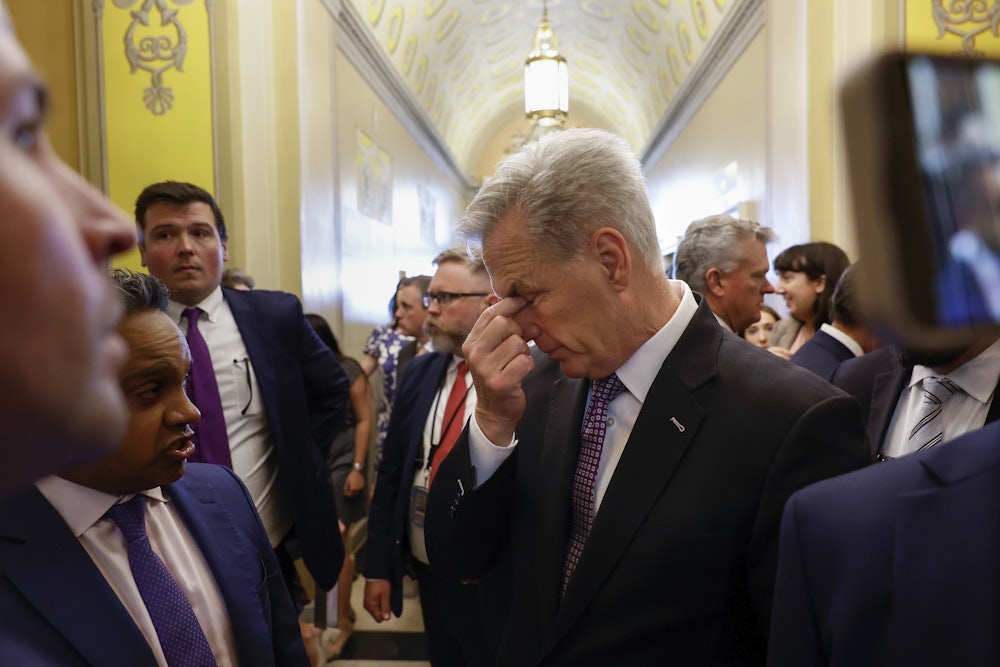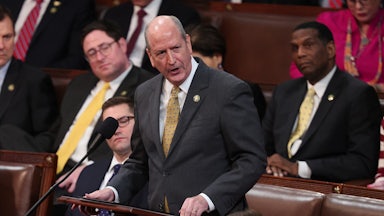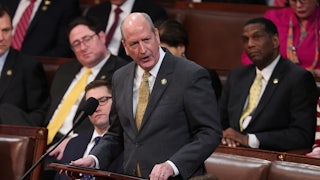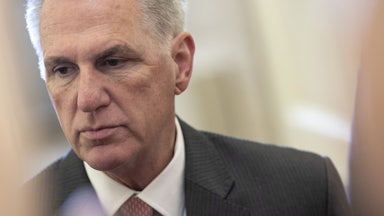Getting to a deal to raise the debt ceiling was supposed to be the hard part. But dozens of lawmakers on both sides of the aisle decried the agreement concocted over the weekend by President Joe Biden and House Speaker Kevin McCarthy, the clouds of complaints imbuing the Capitol with a decidedly peevish atmosphere on Tuesday. The House may vote on the legislation as early as Wednesday, but it remains an open question as to whether the Republican majority can get it across the finish line and how many Democrats will join them in their efforts.
As Representative Marjorie Taylor Greene, the oracle of the modern Republican Party, put it: She’s “leaning yes,” but the bill is a “shit sandwich.”
Greene’s assessment may be charitable, given that she might still eat it. Several other rank-and-file GOP members expressed opposition to the measure on Tuesday. “Republicans got
outsmarted by a President who can’t find his pants,” tweeted
Representative Nancy Mace, who is well known for bucking
her party in the press while still largely voting the party line. “I’m voting NO on the debt ceiling debacle because playing
the DC game isn’t worth selling out our kids and grandkids.”
McCarthy’s struggles threaten to extend beyond a potential revolt over this bill. As part of his exhausting quest to become speaker, he made a series of concessions to his conference’s conservatives, such as restoring the ability of a single member to call for a no-confidence vote in the speaker. When Nancy Pelosi regained the speaker’s gavel in 2019, Democrats changed that rule, which had been instrumental in then-Speaker John Boehner’s 2015 downfall, so that such a motion could only be introduced with the support of a majority of one of the two parties. As part of his wheeling and dealing to secure the votes of a few staunch ultraconservative holdouts, McCarthy agreed to lower the threshold again to one member.
Conservative firebrand Chip Roy, one of three far-right members McCarthy had named to the influential Rules Committee in another speakership-campaign concession, was among a few Republicans who hinted at a move against McCarthy. Speaking to conservative commentator Glenn Beck on Tuesday afternoon, Roy warned that if he could not quash the bill, Republicans would need to “regroup and figure out the whole leadership arrangement again.”
“The Republican conference right now has been torn asunder,” Roy blustered in a House Freedom Caucus press conference later on Tuesday, pulling his fists apart for dramatic effect. “Not one Republican should vote for this deal. Not one.” Proof that it’s a bad deal? The fact that moderate Democrats, Mitt Romney, and Bill Kristol think it should pass, Roy said.
It’s unclear whether the conservatives’ bite will match their bark, however. Representative Ken Buck told reporters that while he had raised the motion to vacate on a conference call with fellow Freedom Caucus members on Monday, the group’s leader, Representative Scott Perry, had responded that it was “premature” to consider it. House Majority Leader Steve Scalise, presenting the face of a happy warrior in a cheerful press briefing after the conference meeting, told reporters, “I don’t think that’s where it’s going.”
Indeed, the far right was no more unified than the GOP as a whole. Representative Thomas Massie, another one of the three conservatives McCarthy gave Rules Committee spots, supported bringing the bill to the floor. “My interest in being on this committee was not to imprint my ideology,” Massie said. “I think that’s an inappropriate use of the committee.” Noting the excitement about a Rules Committee vote—the press is not immune to last-minute dealmaking drama, in fact often reveling in it—Massie wryly said, “With that, the cameras are dismissed.”
With Massie’s support, the bill was reported out of the committee with a 7–6 vote—minus the support of Roy and GOP Representative Ralph Norman. However, Norman told reporters after a lengthy conference meeting on Tuesday evening that he believed the bill had the votes to pass.
Still, the legislation’s fate once it reaches the floor remains an open question. House Minority Leader Hakeem Jeffries told reporters that House
Republicans had promised to produce “at least 150 votes” to support the
deal.
Representative Tim Burchett, one of four GOPers to vote against the bill last month, predicted that it would be a hard mark to achieve. “It’s going to be close,” he said, adding that a lot of the public uncertainty and lobbying is performative. “I think everyone’s minds are made up,” he told me. “I just think they’re waiting to say.”
Jeffries has to deal with discontent on his side as well. Speaking to reporters in an impromptu hallway confab without a tie but with talking points, Jeffries expressed his “appreciation” for Biden for “arriving at a resolution that does three important things”: avoiding default, suspending the debt ceiling through 2025, and protecting “incredibly important Democratic interests,” e.g., Social Security, Medicare, and Medicaid.
When I asked later on Tuesday how his caucus was responding to the deal, Jeffries was diplomatic: “I think over the last several days, there’s been a high degree of engagement with the Biden administration and that members have been pleased with the information that they have been receiving.”
Not all of his members are pleased, by any stretch. Progressives are nearly as angst-ridden over the deal as their Republican counterparts, albeit for different reasons. Representative Jamaal Bowman, another progressive, told me that he was “pretty down, pretty dejected, pretty frustrated by this entire process.” But he still defended Biden, arguing that “the president quite honestly kicked McCarthy’s butt during negotiations.” He added: “They wanted way more and got a very little piece of what they wanted, but still overall the deal is bad for most vulnerable Americans.”
Representative Pramila Jayapal, the chair of the House Progressive Caucus, told reporters that the group had spoken about the deal on Monday evening but that a whip count was ongoing to see how members wished to vote. “We do want to immediately sit down with the president and some of the leadership of the Progressive Caucus, and talk about what the next two years is going to be like,” Jayapal said.
And some Democrats foresaw trouble regardless of the deal’s substance. “I certainly don’t think that the outcome justifies the [default] risk that [McCarthy] put the country under, even if you believe in the things that they believe in,” Representative Dan Kildee told me, standing on the Capitol steps in the cool evening air of almost-summer. “If this now just validates the use of this threat as a legislative tool, that’s a dangerous thing.”
Meanwhile, the Democratic leadership’s spin machine was in full tilt on Tuesday. As messaging guidance developed by the House Democratic Policy and Communications Committee, or DPCC, argued, “the President successfully protected his and Democrats’ core priorities and the historic economic progress we’ve made over the past two years.”
For example: Sure, the bill includes additional work requirements for able-bodied adults without dependents, increasing the age threshold for requirements from 49 to 54, but it codifies exemptions for the unhoused, veterans, and young adults exiting foster care. “The combined effect of these provisions is that the number of people subject to SNAP work requirements will likely stay roughly the same,” a background document circulated by the DPCC argued. A report by the Congressional Budget Office released on Tuesday found that the bill would increase direct spending on food stamps by more than $2 billion over 10 years and allow around 78,000 people to gain access to benefits, perhaps making it more palatable to progressives. (For their part, Republicans played down the report, with Agriculture Committee Chair Glenn Thompson telling reporters that “CBO got their numbers wrong.”)
Assuming the House passes the bill—not a
certainty—senators will find their own nits to pick. GOP Senator Rand
Paul told reporters Tuesday that he would block a time agreement to
process the bill quickly if he did not receive a vote on his own
deficit-reduction proposal as an amendment.
On the Democratic side, Senator Elizabeth Warren, another prominent progressive, decried that “the Democrats once again are called on to be the grownups” by supporting an unpalatable but necessary legislation. When I asked if her Democratic colleagues share her exasperation, she replied: “I am hearing a lot of frustration as people turn over another a rock and see something slimy crawl out.”
Some of the complaints were more parochial. Virginia Senator Tim Kaine has introduced an amendment to block the Mountain Valley Pipeline, which the Biden-McCarthy deal authorizes. The project, a major priority for one of Kaine’s Democratic colleagues, West Virginia Senator Joe Manchin—who happens to be up for reelection this year—would run through parts of both men’s states. But Kaine argued that it is not germane to the debt ceiling.
“If you drop a provision into a bill that affects Virginians, a big controversial project, and you expect me, like, to just salute? You have not been paying attention to me,” Kaine said, adding that he believed he was “entitled” to an amendment vote, although he did not say whether he would vote against the deal if the pipeline was included in the final version. “Nobody bothered to reach out to say, ‘Hey, how do you feel about it?’”
Even the deal’s supporters on both sides of the aisle could muster little enthusiasm. “Today’s bill is a compromise, and reflects the reality of divided government,” Representative Tom Cole, the House Rules Committee chair, intoned as his panel started debating the bill.
Senate Majority Leader Chuck Schumer, who had been essentially cut out of any final negotiations between the president and the House Republican speaker, struck a similar note. “Nobody got everything they wanted, but this bill is the responsible and prudent and necessary way forward,” Schumer said in a speech on the Senate floor.
But Representative Jim McGovern, the ranking Democrat on the Rules Committee, invoked perhaps the most common Democratic reaction to the deal, bestowing the ringing endorsement that “it could have been worse.” He added: “This is not a happy day.”




